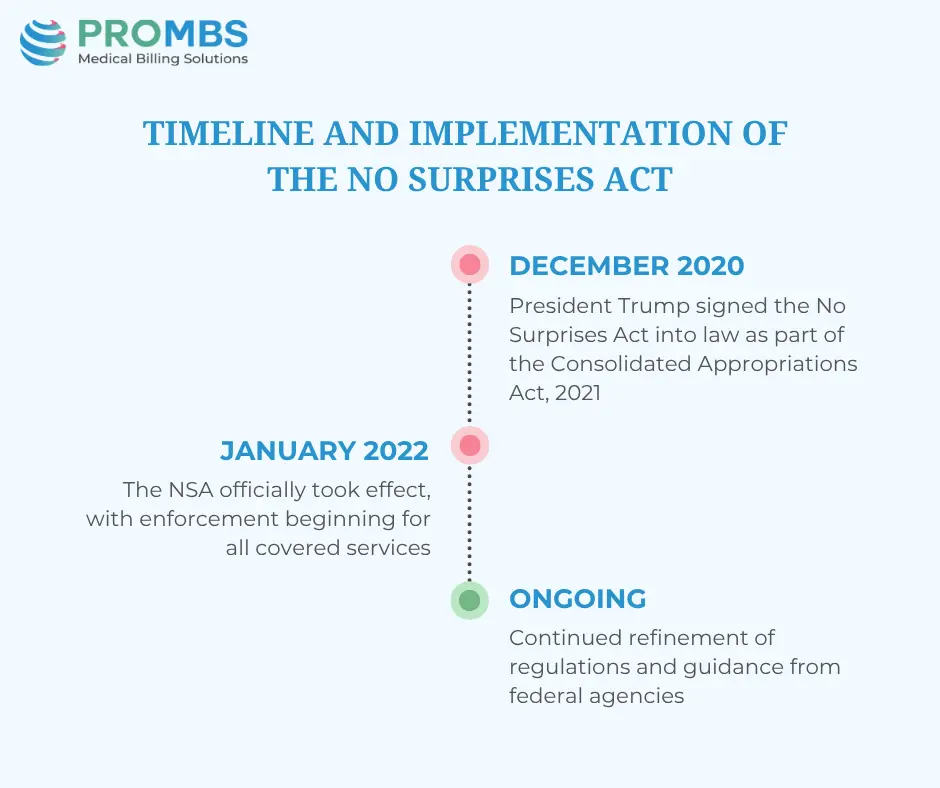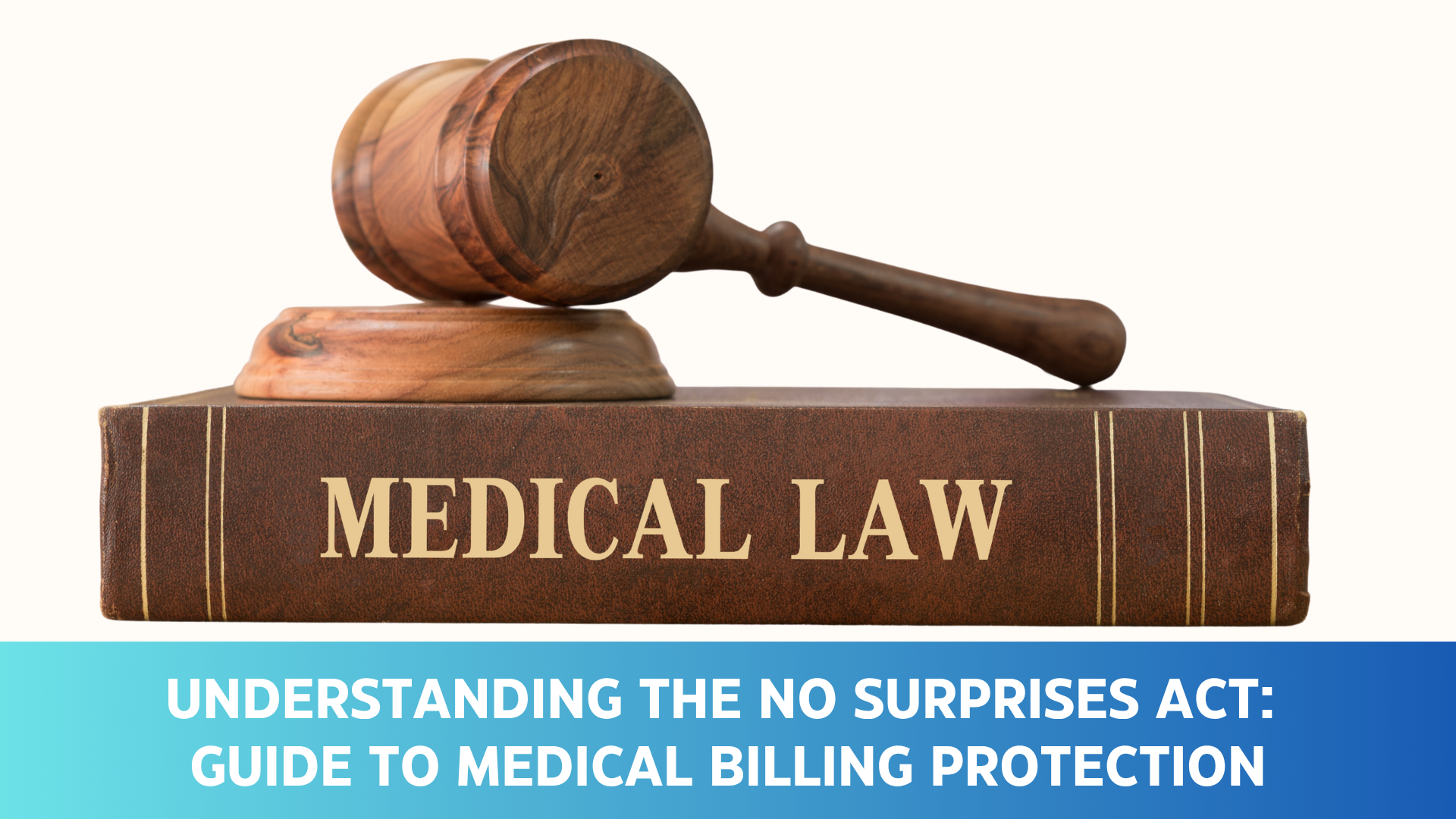Understanding the No Surprises Act: Your Guide to Medical Billing Protection
The No Surprises Act represents the most significant patient protection legislation in decades, eliminating unexpected medical bills and bringing transparency to healthcare costs. Whether you're a patient, provider, or billing professional, understanding this landmark law is essential for navigating today's healthcare landscape.
What Is the No Surprises Act?
The No Surprises Act (NSA) is comprehensive federal legislation designed to protect patients from unexpected medical bills, particularly those arising from out-of-network care during emergencies or when receiving treatment at in-network facilities.
Key Objectives of the NSA
Patient Protection
Eliminates surprise billing for emergency services, regardless of network status
Cost Transparency
Requires Good Faith Estimates for uninsured patients and advance notice of charges
Provider Accountability
Establishes clear rules for billing practices and dispute resolution processes
The NSA fundamentally changes how healthcare providers, insurance companies, and patients interact regarding billing and payment responsibilities. It creates a safety net that ensures patients aren't caught off guard by astronomical medical bills they never anticipated.

The legislation came after years of bipartisan effort to address the growing crisis of surprise medical billing. Implementation required extensive coordination between the Departments of Health and Human Services, Labor, and Treasury to ensure comprehensive coverage across all healthcare sectors.
Why the No Surprises Act Was Necessary
Before the NSA, surprise billing was a widespread problem affecting millions of patients annually. Studies showed that one in five emergency room visits resulted in surprise bills, with patients receiving unexpected charges averaging thousands of dollars.
Pre-NSA Challenges
- Emergency services at out-of-network facilities
- Out-of-network providers at in-network hospitals
- Lack of price transparency for uninsured patients
- Complex insurance networks with frequent changes
- Limited patient choice during medical emergencies
The financial impact was devastating for families, with medical debt becoming a leading cause of bankruptcy. Patients often faced impossible choices between receiving necessary care and protecting their financial stability, highlighting the urgent need for legislative intervention.
How the No Surprises Act Protects Patients
Before the NSA, surprise billing was a widespread problem affecting millions of patients annually. Studies showed that one in five emergency room visits resulted in surprise bills, with patients receiving unexpected charges averaging thousands of dollars.
Emergency Services Protection
Patients cannot be balance billed for emergency services, regardless of whether the hospital or provider is in-network. Insurance must cover these services at in-network rates.
In-Network Facility Coverage
When receiving care at an in-network facility, patients are protected from surprise bills from out-of-network providers, including anesthetists, radiologists, and pathologists.
Good Faith Estimates
Uninsured patients must receive upfront cost estimates for scheduled services, helping them make informed decisions about their healthcare costs.
The NSA creates a comprehensive framework that eliminates the uncertainty surrounding medical costs. Patients can now seek emergency care without fear of financial ruin, whilst planned procedures come with clear cost expectations that help families budget for healthcare expenses.
| Situation | Pre-NSA | Post-NSA |
|---|---|---|
| Emergency care at out-of-network ER | Patient responsible for balance | Protected – No balance billing |
| Scheduled surgery at in-network hospital with OON anesthesiologist | Surprise billing likely | Protected under NSA |
| Elective OON procedure with signed consent | Patient pays full cost | Still allowed with informed consent |
Provider Compliance Requirements Under the NSA
Good Faith Estimate Preparation
Providers must furnish detailed cost estimates within three business days of scheduling or upon patient request, including all anticipated charges from co-providers.
Patient Consent and Disclosure
Clear notification requirements for out-of-network status, allowing patients to give informed consent for non-emergency services that exceed specific cost thresholds.
Independent Dispute Resolution
When providers and insurers cannot agree on payment, the federal IDR process provides binding arbitration to resolve disputes fairly.
Providers need robust administrative systems and thorough staff training to consistently meet compliance requirements. Providers must maintain detailed documentation and establish clear protocols for estimate preparation and patient communication.
Advantages and Challenges of the No Surprises Act
Benefits for Patients
- Elimination of surprise medical bills
- Increased price transparency
- Protection during emergencies
- Improved access to cost information
- Reduced medical debt risk
Provider Advantages
- Clearer billing guidelines
- Reduced patient disputes
- Structured payment processes
Implementation Challenges
- Complex administrative requirements
- Staff training needs
- System integration costs
- Estimate accuracy demands
- Potential payment delays
Industry Concerns
- Reduced reimbursement rates
- Increased operational complexity
- IDR process uncertainties
Whilst the NSA creates significant benefits for patients, healthcare providers face substantial operational changes requiring investment in new systems and processes to ensure compliance.
Key Takeaways and Moving Forward
The No Surprises Act represents a fundamental shift towards patient-centred healthcare billing, creating unprecedented protection against unexpected medical costs whilst establishing clear compliance requirements for providers.
For Patients
Understand your rights under the NSA and request Good Faith Estimates for planned procedures. You're protected from surprise bills in emergency situations and when receiving care at in-network facilities.
For Providers
Invest in compliance systems and staff training to meet NSA requirements. Develop robust estimate processes and maintain clear patient communication protocols to avoid penalties.
For Billing Professionals
Stay current with evolving regulations and ensure your systems can handle Good Faith Estimates, proper disclosures, and IDR processes effectively.
The healthcare industry continues adapting to these changes, with ongoing refinements to regulations and processes. Success depends on transparency, patient education, and strong compliance systems that safeguard both patients and providers in today’s healthcare billing environment.



